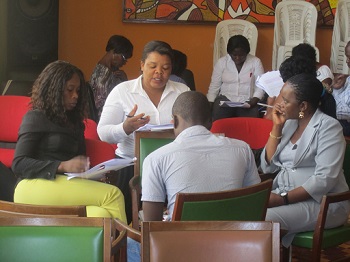Project
Increasing Women’s Participation in Politics and Decision Making in Angola
- Angola
- March 2013
Increasing Women’s Participation in Politics and Decision Making in Angola targeted the women’s organizations of Angola’s political parties and other platforms that work to promote the political empowerment of women. Participants found the issues addressed by the project interesting and appreciated the participatory methodology, which encouraged interaction among people who in many cases were from different political parties, enabling them to get to know one another. However, the decline of the grantee’s institutional capacity substantially lessened the project’s potential impact.
Lessons from Project
💡
- Women's empowerment
- Angola
- March 2013
Training and radio programmes developed in Angola were the most effective project components, unquestionably raising awareness about the issues discussed. What remains unclear is their subsequent usefulness and the degree of ownership they inspired in the women involved. Also unclear is the extent to which the project tangibly contributed to greater equality between men and women political office-holding and, above all, to an improvement in the “quality” of their participation. There is no registry or procedure for evaluating or monitoring specific outcomes, which undoubtedly undermined project efficiency.
The project had difficulty executing other activities (baseline, monitoring, and impact assessment). An adequate strategy for outcome and impact monitoring was not designed. The grantee had many training initiatives but their focus seemed to be the execution of activities, with not enough attention paid to achieving strategically planned behavioral changes.
💡
- Women's empowerment
- Angola
- March 2013
The grantee could have strengthened partnerships with state institutions during the drafting of the National Gender Equality Policy execution phase. In the future the grantee should conduct a thorough review of the demand and strengths of the CSOs that share objectives and human resources. This could open up new opportunities for participation formalized in a consensus-based agenda and action plan.
💡
- Women's empowerment
- Angola
- March 2013
The grantee needed to develop impact monitoring and evaluation mechanisms. The absence of monitoring and evaluation mechanisms (record of activities, risk analysis, monitoring in the provinces, outcome and impact assessment) affected the quality of the project’s outcomes and the extent to which they were achieved. No strategy to capitalize on the impact achieved had been executed. Opinions about the project’s results are very general. The members of the technical team and the beneficiaries interviewed all had difficulty recalling the activities in which they had participated in any detail.
💡
- Women's empowerment
- Angola
- March 2013
The project had a positive impact on the grantee itself. The workshops and seminars that were held strengthened the NGO as a forum for interaction among organizations committed to promoting gender equality. The project also improved its opportunities for dialogue with state agencies; it also enabled it to obtain an audience with the President of the National Assembly to, among other things, make its request for recognition as a public interest organization. Securing this recognition would substantially improve its situation and bolster its institutional capacity.
💡
- Women's empowerment
- Angola
- March 2013
The project also collaborated closely with the Ministry of the Family and Women’s Promotion and the Women Parliamentarian’s Group10 in Angola. The purpose of this group, created in 1995, is to integrate the gender perspective into legislation, promote the exercise of women’s rights, and fight all forms of exclusion. Strategically, the selection of the project’s partner organizations was wise, especially in view of their potential impact and multiplier effect, since all of them were involved in the training activities.
💡
- Women's empowerment
- Angola
- March 2013
The training, public awareness activities and radio broadcasts were important to political party women’s organizations, CSOs, and journalists in Angola. These outputs significantly impacted on women as individuals. They gained a greater understanding of the importance of participating in political parties, and many of them registered to vote in time for the 2012 elections.
💡
- Women's empowerment
- Angola
- March 2013
The project was implemented at an opportune time (2011-2012), coinciding with the run-up to the 2012 elections. It also aligned with the drafting of the National Gender Equality Policy (2013) as part of the Angolan Government priority action for equal participation for men and women. The project objective thus responded to the unmet needs and challenges of the Angolan context, especially in the provinces and at the local level.
